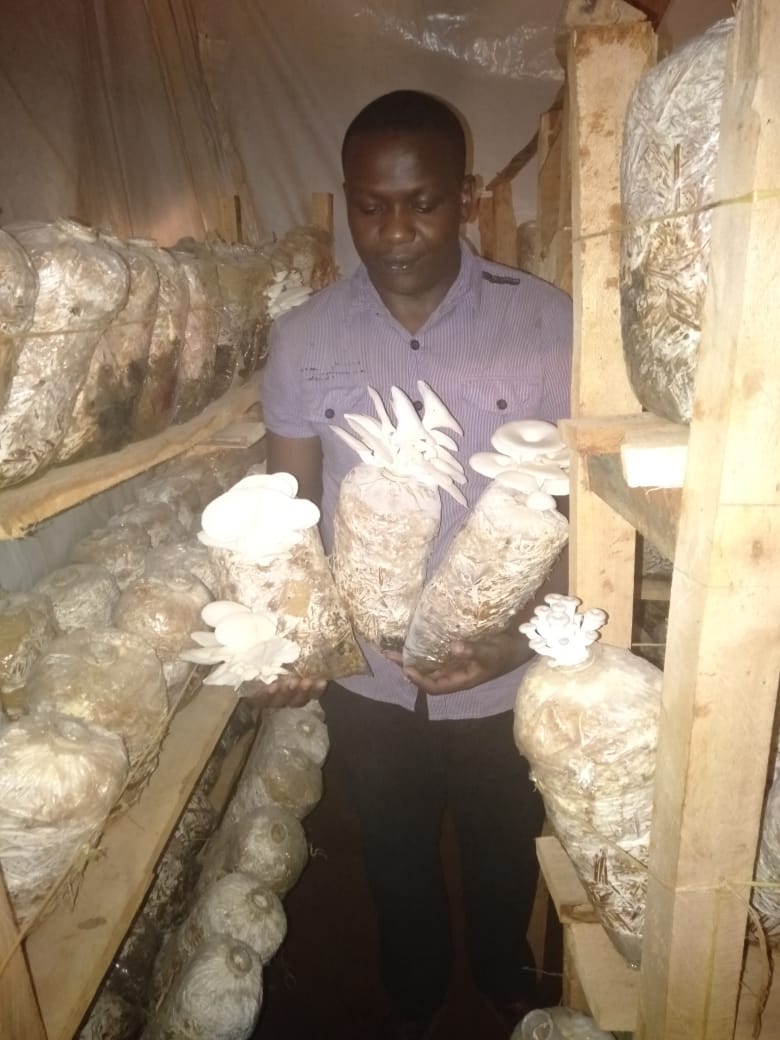 Charles Gathari, Finance and Marketing Director, Chapvin Mushrooms holding bags of sprouted oyster mushrooms at Igegania, Thika.
Charles Gathari, Finance and Marketing Director, Chapvin Mushrooms holding bags of sprouted oyster mushrooms at Igegania, Thika.
Three college students and founders of Chapvin Mushrooms decided to pursue their passion in farming, a venture that is now earning them Sh6,000 a week as opposed to pursuing their different careers.
Charles Gathari 24, Kelvin Mwangi 23 and Peter Ngugi 23 could save part of their pocket money while studying, and invested Sh54,000 into the business opting to plant oyster mushrooms in Igegania, Thika on a 5x5m piece of family land.
“We started saving money in college while assessing the market and looking for a low investment yet lucrative business to start. We opted for oyster farming not knowing we could turn it into a successful business,” said Charles, Finance and Marketing Director, Chapvin Mushrooms which the three friends started in December 2018.
To start with, they built a mud- house with a capacity of 1,000 bags then prepared a substrate, a medium through which mushrooms grow using wheat straws. They bought 28kgs of spawns at Sh600 a kilo from Jomo Kenyatta University of Agriculture and Technology (JKUAT).
The farmers made 25 stacks of hay which they filled in 700 bags for planting the spawns that took 3 -4 weeks to mature, producing 700 punnets of mushrooms which they sold at Sh125 per punnet making Sh6,000 a week.
“The idea of starting a business with minimal capital was daunting at first, but after a good production in the first cycle, we knew the business was scalable,” he said.
RELATED ARTICLE: Accountant\'s job or mushroom farming; mushrooms earn more
Today they are producing 1,000 punnets per production cycle and projects to produce 1,350 punnets by May 2019.
“We currently produce 80-100 punnets a week. However, we project to produce one tonne in the current cycle equivalent to 1,000kgs. If we prorate this profit to expected produce, it will translate to 4,000 punnets, meaning we will make a profit of up to Sh250, 000,” Charles said
According statistics from the National Farmers Information Service (NAFIS), Kenya produces 500 tonnes annually against a demand of 1200 tonnes.
RELATED ARTICLE: Masters graduate creates own job with mushroom farming in Kakamega
The business, like any other does not lack challenges, the trio cites inadequate capital, lack of market as some of their challenges.
They currently supply the mushrooms thrice a week to local customers in Igegania, JKUAT main campus in Juja and museums.
“We started supplying the mushrooms to local retailers in Igegania and thereafter expanded in to institutions.
“Oyster farming is a labour intensive venture that requires great training. You cannot miss a step while preparing substrate otherwise, it will turn in to manure leading to massive losses. Incubation stage requires a lot of attention in order to monitor rats and other rodents. The high cost of spawns and wheat has also declined our growth,” he says.
RELATED ARTICLE: Youth eyes Russian market with oyster mushroom
Having started a successful business, the three farmers decided to blaze the trail for other young entrepreneurs by starting a training and mentoring programme for the youth in Igegania.
“We are proud to be a good example; encouraging young men and women to embrace entrepreneurship. We started a mentorship programme in Igegania that provides the youth with guidance on how to effectively sustain their businesses,” said Charles
“Mushroom farming has broadened our minds to a great extent. We now know the basics of running a sustainable business and effective farming techniques.”
RELATED ARTICLE: How to grow mushrooms for export
Besides working part-time on the business, Charles is a full-time professional accountant at Conix industries while Peter works at Rwathia Girls Secondary School, and set to graduate in November 2019. On the other hand, Kelvin is still studying but also finishing in July 2019.
The team aspires to be the leading producers of both fresh and dried Oyster mushrooms in Kenya, exporting to other countries once they have satisfied the current market. And further plans to diversify into selling mushroom growing bags and substrates.
















Comments powered by CComment